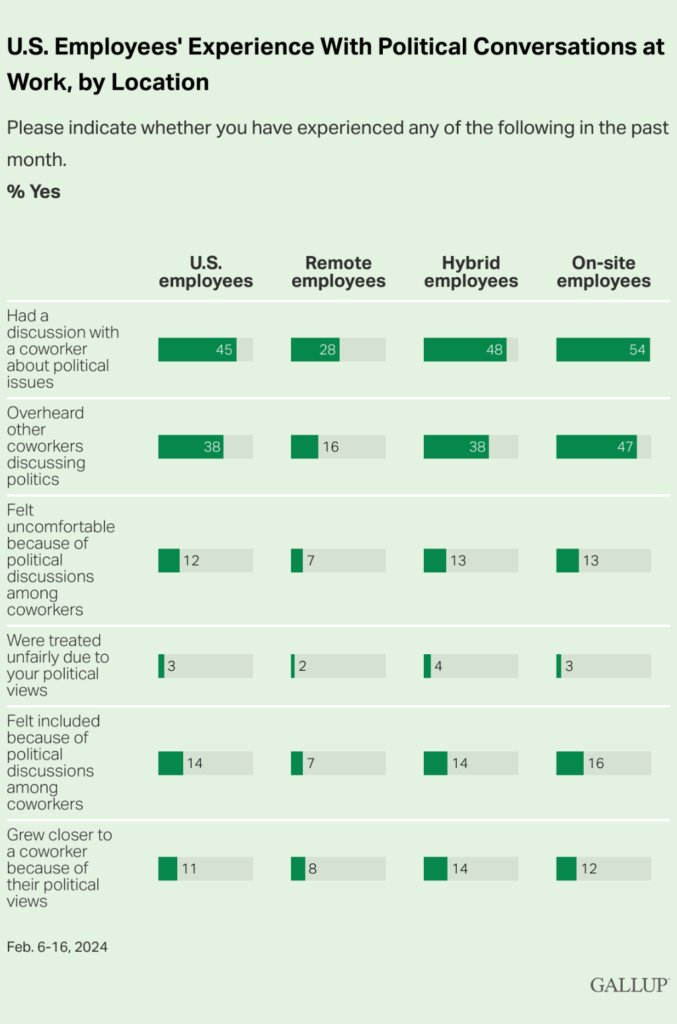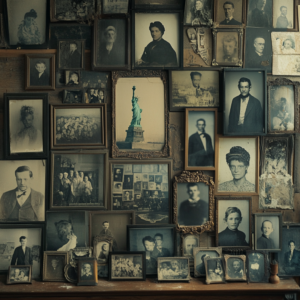Political talk plagues workers months after elections
Why Do Political Discussions at Work Increase Stress and Cynicism?
Let’s face it: political discussions can get messy, especially in the workplace. After the 2016 U.S. presidential election, the American Psychological Association (APA) found that stress and cynicism skyrocketed among employees:
- Pre-election: 17% of workers felt stressed, and 15% felt cynical.
- Post-election: Those numbers rose to 26% and 21%, respectively.
What does this mean for the workplace? Imagine you’re trying to finish a project, but heated debates in the breakroom are draining your energy and focus. That’s how political tension can seep into your workday, making everything harder.
How Do Political Discussions Negatively Impact Workplace Performance?
It’s no secret that political debates can derail productivity. Here’s how they affect work:
- Reduced productivity: People get distracted by arguments.
- Poorer work quality: Stress makes it harder to focus.
- Difficulty completing tasks: Anxiety from these discussions impacts performance.
Picture this: A team meeting gets derailed when coworkers argue about a recent political headline. The project deadline suffers, and relationships strain. That’s the reality for many workplaces.
How Common Are Political Discussions at Work?
You’re not alone if it feels like politics is everywhere at work. APA data shows:
- 54% of employees have engaged in political discussions at work.
- 31% witnessed coworkers arguing.
- 24% avoided coworkers due to differing views.
It starts innocently—someone comments on the news, and suddenly, you’re caught in a heated debate. Or worse, you start avoiding coworkers altogether, making collaboration even tougher.

Why Do Political Arguments Strain Workplace Relationships?
Politics can hit close to home, and disagreements can lead to lasting damage. According to APA:
- 16% of employees developed negative views of coworkers.
- 18% reported more workplace hostility.
- 17% saw team cohesiveness decline.
For example, a disagreement over policies like immigration or healthcare can turn into resentment, creating an “us vs. them” dynamic that’s hard to shake.
How Do Political Discussions Specifically Affect Job Performance?
The numbers speak for themselves:
- 15% of workers struggled to complete tasks.
- 13% noticed a dip in work quality.
- 14% experienced reduced productivity.
Imagine being in a brainstorming session where every idea is filtered through political biases. Creativity takes a backseat, and everyone’s output suffers.
Do Women and Men Experience Political Tensions at Work Differently?
Interestingly, the impact of political tension varies by gender. After the 2016 election:
- Women saw a bigger increase in cynicism (from 9% to 20%).
- Men’s cynicism rose slightly less (from 20% to 23%).
This could be tied to the personal nature of many political issues, like gender equality, which can feel more pressing to female employees.
Are Certain Political Affiliations More Affected by Workplace Political Tensions?
Political affiliation plays a role in how employees experience workplace stress:
| Political Affiliation | Tense or Stressed | Increased Hostility |
|---|---|---|
| Liberals | 38% | 26% |
| Moderates | 22% | 16% |
| Conservatives | 21% | 13% |
For instance, liberal employees might feel isolated in conservative-leaning workplaces, while moderates may find themselves caught in the middle.
Why Are Political Tensions So Personal?
Politics often touch on deeply personal issues—civil rights, economic security, and more. Social media adds fuel to the fire, creating echo chambers and amplifying divisions. When these tensions spill into work, they can feel impossible to escape.

How Can We Navigate Politics at Work with Trump Taking Office in 2025?
The return of Donald Trump to office in 2025 adds a new layer of workplace tension. Here’s how we can handle it:
Why Is There More Political Tension in the Workplace?
- Intertwined Identities: People tie political beliefs to personal values, making it hard to separate politics from work.
- Social Media: Platforms amplify opinions, leading to clashes.
What Can Employers Do About These Tensions?
- Address Issues Early: Don’t wait for conflicts to explode—proactively foster a respectful culture.
- Create Dialogue Spaces: Host forums for employees to share perspectives without judgment. For example, a facilitated discussion can help diffuse tension.
What Can Employees Do to Navigate Political Tensions?
- Communicate Respectfully: Avoid derogatory comments and focus on listening.
- Set Boundaries: Politely steer conversations back to work topics.
What Is HR’s Role in Managing Political Tensions?
- Intervene Promptly: Address inappropriate behavior immediately.
- Set Clear Policies: Include guidelines in handbooks.
- Train Managers: Equip leaders to mediate conflicts effectively.

Why Did Many Companies Reinstate Remote Work During the 2024 Election?
The 2024 election season was so tense that many companies reinstated remote work. Why? It was a practical way to avoid clashes.
Why Did Employers Choose Remote Work as a Solution?
- Conflict Avoidance: Remote work kept employees from face-to-face arguments.
- Stress Reduction: Being away from the office helped employees manage anxiety.
What Are the Benefits of Temporary Remote Work During Elections?
- Better Focus: Employees could work without distractions.
- Improved Well-being: Avoiding heated debates reduced emotional strain.
What Can Leaders Learn from This Strategy?
- Anticipate Tensions: Offer remote options during contentious times.
- Provide Support: Ensure employees have access to mental health resources.
What Are the Key Takeaways for Leaders and Employees?
Workplace political discussions can disrupt productivity, harm relationships, and stress employees. But by fostering respect, setting clear boundaries, and offering support, both leaders and team members can navigate these challenges. Together, we can create workplaces that thrive—even during the most divisive times.





